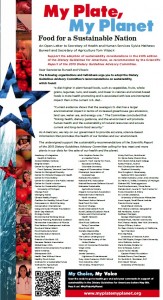Dietitians to remove their “endorsement” from Kraft Singles
Congratulations to Sonja Connor, president of the Academy of Nutrition and Dietetics, for this decision about the Kids Eat Right partnership with Kraft (this letter was sent to me by several AND members). Congratulations also to all of the AND members who let their disappointment with this partnership be known.
I want to update all of you on a few immediate actions we are taking on the Kids Eat Right pilot initiative with Kraft. As our Academy members, you deserve the most immediate as well as accurate information that we are able to provide.
The Academy and Kraft are in discussions to terminate the contract for our pilot program. This will take a short period of time to complete. We will continue to keep you posted as we move to finalize the termination.
Elements of the program are already in motion and cannot be changed. On April 1, Kraft Singles will begin appearing on retail shelves with the Kids Eat Right logo on the packaging. We are working with Kraft to limit the time it remains on the shelves.
The Academy deeply regrets the circumstances that have led to the pending termination of this initiative. As we have shared previously, we launched this initiative to raise consumer awareness about the importance of having vitamin D and calcium as essential nutrients in children’s diets.
This pilot initiative was never intended to be an official Academy endorsement of a particular product, which is strictly prohibited by our policy and is expressly included in all contracts.
The Board and Academy leadership are taking immediate steps to avoid a similar situation in the future. We will engage with the Academy House of Delegates and with all Academy members on future initiatives to promote healthful foods and nutrition in the most professional, ethical and transparent manner possible.
Thank you for your continued support of the Academy and your patience as we resolve this situation.
And congratulations to Andy Bellatti, founder of Dietitians for Professional Integrity, a group working to uncouple the Academy from its cozy ties to food companies (these were documented by Michele Simon a couple of years ago). His quote in the New York Times:
Hopefully, this is the beginning of much-needed and much-overdue dialogue on the academy’s corporate sponsorships…Dietitians need to continue advocating for an organization that represents us with integrity and that we can be proud of, rather than continually have to apologize for.






